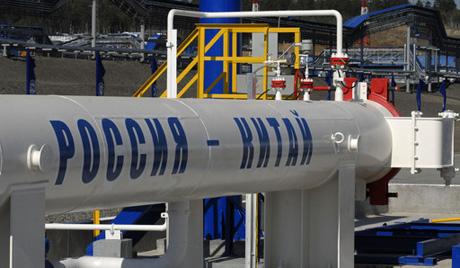
SHIFTING POWER BALANCE

When Russian President Vladimir Putin touches down in China for a closely watched two-day state visit May 20, he will encounter an unbalanced relationship that has grown in Beijing's favor, tilted by shifts in global energy supplies and Moscow's increasing friction with the West.
Beijing's leverage is being tested in negotiations to pipe Siberian gas to China that have dragged on for a decade, but that both sides have said they want to conclude in time for an agreement to be signed during Mr. Putin's visit next week. A Chinese foreign ministry official said Thursday that pricing remains a sticking point. Gazprom, Russia's natural-gas company, described the talks as being "in the final stage" after a meeting between its chief executive and a senior Chinese energy official.
Mr. Putin has already leaned to Beijing in one respect. While he and Chinese President Xi Jinping meet in Shanghai, more than a dozen ships from their navies will hold large-scale joint drills in the East China Sea in what security scholars say is a sign of Russian support for Beijing against what China says is a more militarily assertive Japan.
The gesture hasn't been reciprocated in Russia's current standoff with the West over Ukraine. China has remained on the sidelines as the Crimea region seceded from Ukraine to join Russia, out of concern of instability and alienating Western trade partners. Further provocations in Ukraine's restive east risks inviting scorn from the Chinese side, said Niklas Swanström, director of the Institute for Security and Development Policy in Stockholm.
The two-day trip is intended to highlight what China and Russia call their strategic partnership. Mr. Putin will participate in a regional leaders' conference while in China. A coal project in Siberia financed by the Export-Import Bank of China is likely to be among the agreements announced, according to Russian officials. Moscow and Beijing have found advantages in working together to diminish U.S. influence and create greater room for them to pursue international economic and strategic interests. Mr. Putin is widely depicted in Chinese official media as a powerful leader unafraid to take on the West.
Beyond that, however, the relationship is fraught with historic mistrust, experts said, worsened by the gravitational pull of China's enormous economy and Russia's increasing need to sell more energy east to diversify away from its markets in Europe, where demand for Russian natural gas has sagged.
China has been seeking more deals to purchase and license sophisticated Russian weaponry. But after selling China billions of dollars in advanced armaments for a decade, Russia has balked in recent years out of concerns China is copying Russian designs. An influx of Chinese across the border into Russia's sparsely populated Far East is a perennial issue in Russian politics.
While Chinese commentators have pointed to Russia's influence in Crimea's secession as an example of how a great power conducts itself, Beijing hasn't been willing to anger Ukraine, an important supplier of corn, or the U.S. and European Union, China's top export markets.
Heightened global gas supply has put China in a stronger negotiating position, experts said. "China is certainly in a more advantageous position on this issue compared with the last decade," said Wu Xinbo, executive dean of the Institute of International Studies at Fudan University in Shanghai.
The latest version of the deal is expected to include the construction of a pipeline to ship 38 billion cubic meters of gas a year to China from fields in eastern Siberia. That represents more than one-fifth of China's total natural-gas consumption last year, and Beijing has pledged to increase use of natural gas to lessen its vast dependence on polluting coal.
The governments have wrangled over the project for a decade—a preliminary agreement was signed in 2004—with Moscow in recent years pushing for higher prices. Beijing played a waiting game, and during the course of protracted negotiations, global gas supplies surged. Countries once deeply dependent on energy imports, including the U.S., are now considering ramping up exports, and China has found other suppliers.
"The longer these negotiations drag out, the more it is in favor of China getting better pricing," said Gordon Kwan, regional head of oil and gas research at Nomura.
The former Soviet republic of Turkmenistan is now China's largest foreign gas supplier, with further plans to boost supplies. Similarly last year, China started importing piped natural gas from Myanmar.
Elsewhere during the past decade, China struck deals with Qatar and Australia, among others, for long-term supplies of LNG. State energy companies such as China Petrochemical Corp. and China National Offshore Oil Corp. have even bought ownership stakes in LNG projects in Canada.
Russia has sealed a raft of energy deals with China in the past two years as it seeks to pivot its energy policy eastward, including a $270-billion, 30-year contract for Russian state oil firm OAO Rosneft to sell oil to China. Increased competition and regulatory pressure has dented demand for Russian natural gas in the European gas market, Gazprom's most lucrative market.
"The deal is now likely more than ever, but it will only happen if Russia makes a concession," according to Michal Meidan, an independent consultant on energy geopolitics. "Having that successful state visit is important to Putin but not as important for Xi."
wsj.com





